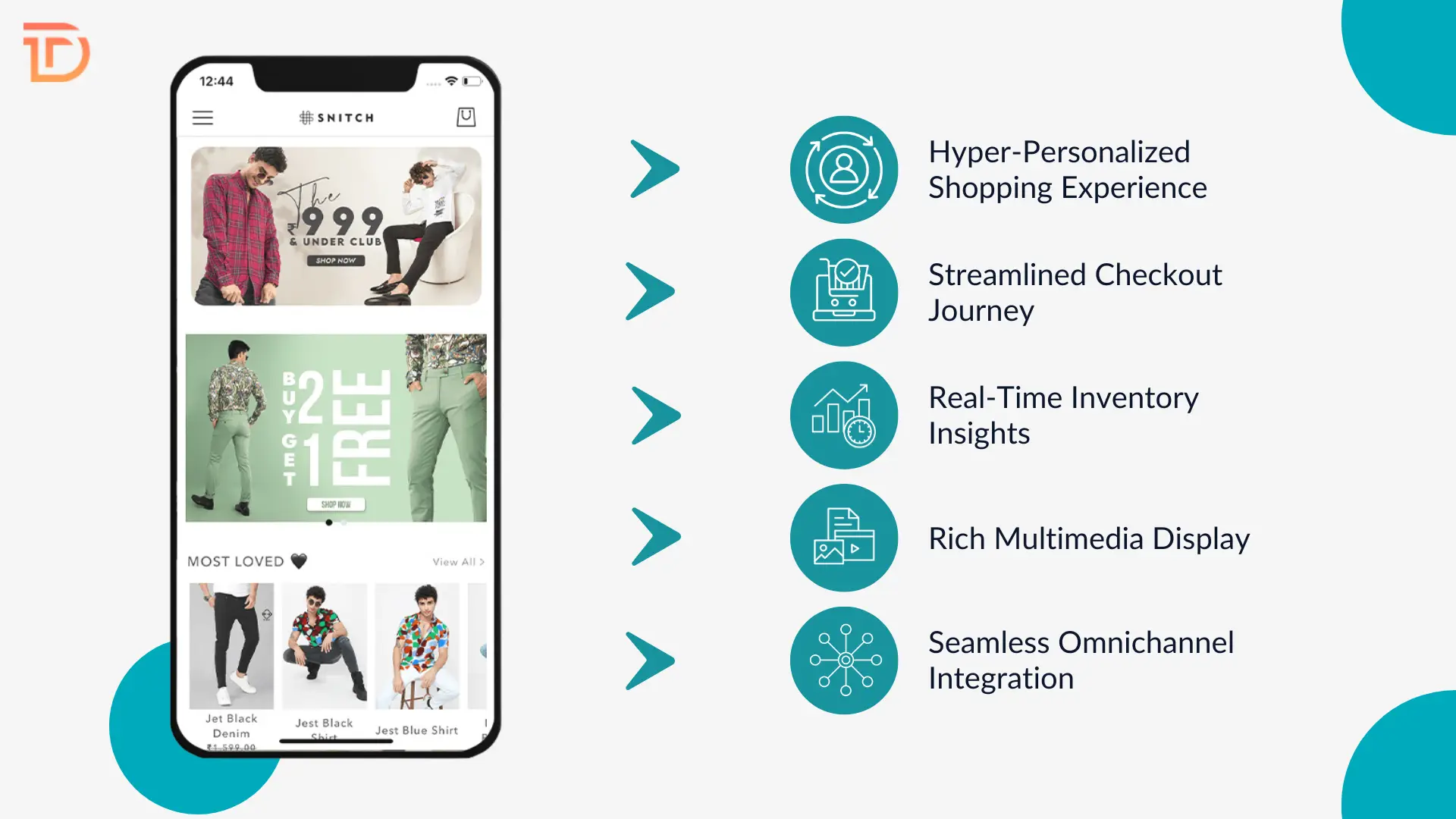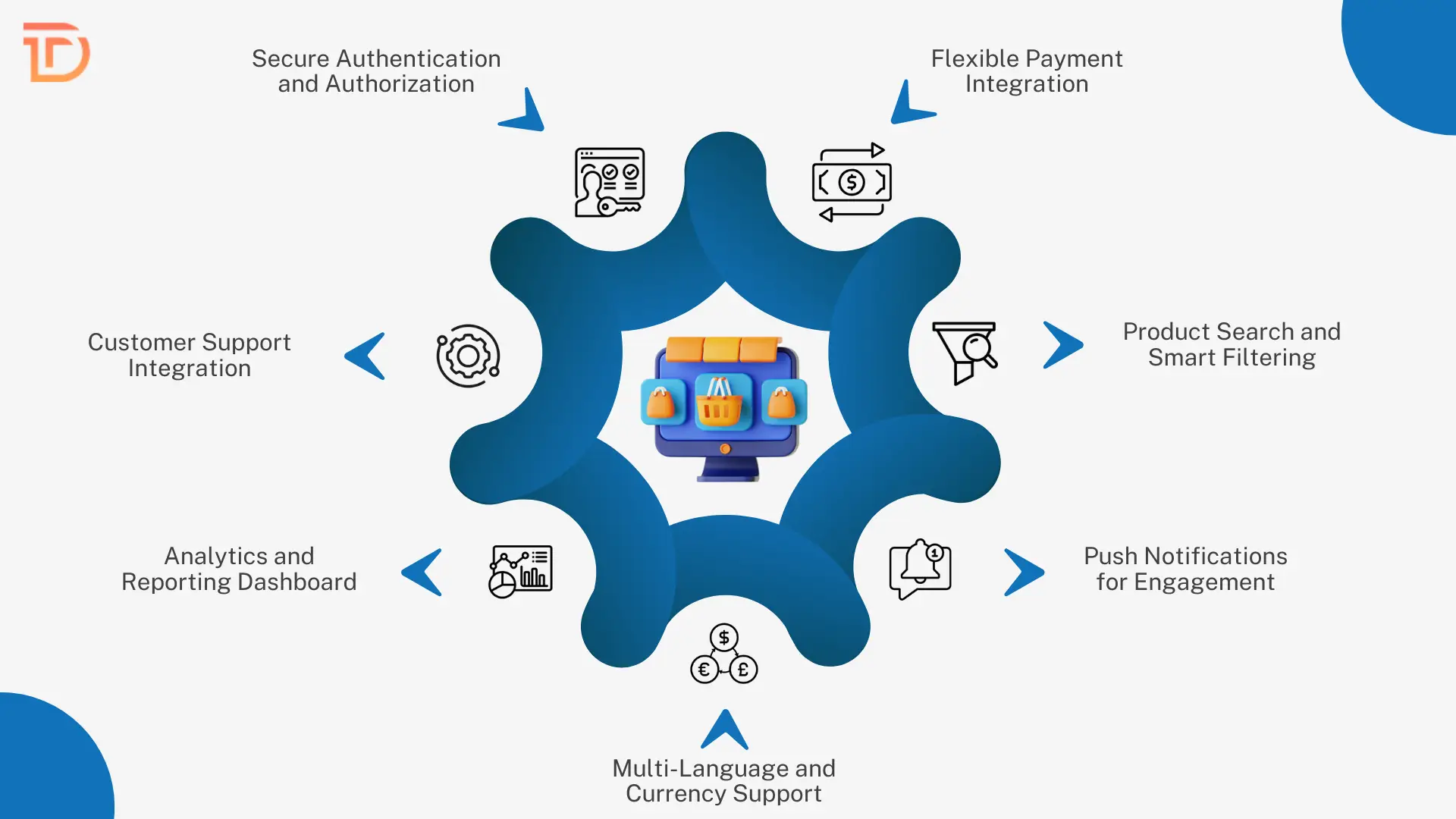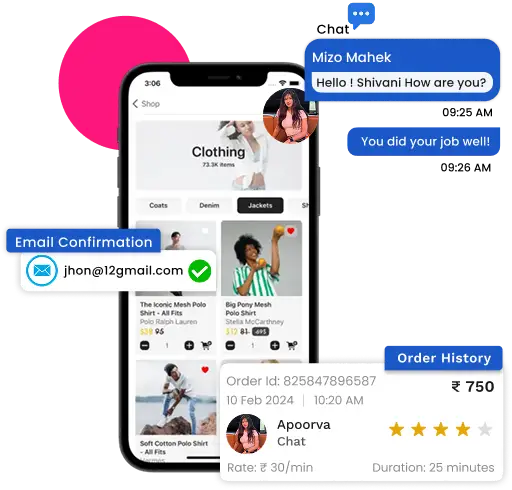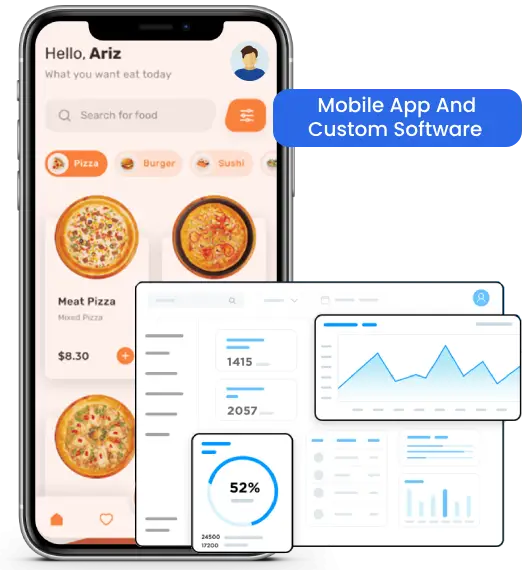Selling products online has grown into more than just convenience; it has become a critical component of modern business strategy. As mobile-first behavior continues to influence how consumers interact with brands, having the right type of ecommerce application determines not only how efficiently your operations run but also how well you connect with your audience. From B2B platforms and direct-to-consumer storefronts to complex multi-vendor marketplaces, the kind of ecommerce app you implement directly impacts user satisfaction, conversion rates, and the long-term success of your digital strategy. In this blog, we’ll explore the different types of ecommerce applications, review key market insights, highlight common development challenges, and explain how a custom-built app can redefine the way your customers shop.
How many Types of ecommerce Applications are There?
Ecommerce applications come in varied formats depending on the industry and customer engagement model. Understanding these categories helps identify what kind of custom solution fits best.
- Business-to-Consumer (B2C): Most commonly associated with online retail, B2C apps cater to direct transactions between brands and end-users. Features often include dynamic pricing, recommendations, push notifications, and personalized discounts.
- Business-to-Business (B2B): These platforms connect wholesalers, manufacturers, or distributors with buyers. Custom B2B apps typically manage bulk orders, tax exemptions, negotiation tools, and tiered pricing, all tailored for organizational workflows.
- Consumer-to-Consumer (C2C): Users interact directly, offering products or services for sale. Examples include online marketplaces where sellers and buyers transact securely. C2C custom apps demand continuous moderation, rating systems, and peer review.
- Consumer-to-Business (C2B): Freelancers and influencers offering services to businesses fall under this category. A tailored app helps structure bidding, service listings, feedback, and secure payment flows.
- Marketplace Model: A hybrid of B2C and C2C where multiple vendors sell under a single brand umbrella. Marketplace apps require vendor dashboards, commission tracking, logistics integration, and dispute management systems.
Ecommerce Application Market Data
The ecommerce app market is undergoing rapid transformation, fueled by mobile-first behavior and omnichannel retail strategies. According to the Mordor Intelligence report on the E-commerce App Market, the global ecommerce app market size is expected to reach USD 5.65 billion by 2029, growing at a compound annual growth rate (CAGR) of 9.72% between 2024 and 2029. North America holds a significant market share, while Asia-Pacific is witnessing explosive growth due to smartphone penetration, digital payments, and improved internet infrastructure. The report also highlights that over 72% of global ecommerce sales are now conducted via mobile apps, underlining the necessity for seamless, high-performance ecommerce applications.
Increasing investment in personalization, AI-based recommendations, and progressive web app technologies are contributing to this surge. Retailers investing in custom ecommerce apps stand to gain enhanced brand loyalty, higher conversion rates, and reduced cart abandonment.
How Can Ecommerce Tailored App Transform the Way Your Customers Shop?
A personalized ecommerce app doesn’t just sell products; it reshapes how customers interact with your brand. The following transformations illustrate its impact:

Hyper-Personalized Shopping Experience
Customer behavior, preferences, and purchase history can be used to display individualized recommendations. This makes every user feel seen and valued, increasing retention and purchase frequency. Personalization extends to promotions, push notifications, and content layout, making the app more intuitive and emotionally resonant.
Streamlined Checkout Journey
A smooth, single-screen checkout process reduces friction. Removing unnecessary steps and auto filling customer data ensures faster, frustration-free transactions. Integration with digital wallets, saved payment options, and smart address prediction shortens completion time and increases conversion rates during high-traffic shopping periods.
Real-Time Inventory Insights
Customers gain clarity on stock availability, delivery timelines, and product variants without delays. This transparency boosts trust and enhances decision-making. Dynamic inventory updates prevent overselling, while alert systems inform users of limited stock or restocks to drive urgency and timely purchases.
Rich Multimedia Display
Interactive images, 360-degree product views, and AR-powered visualization offer customers immersive experiences. This reduces uncertainty and decreases return rates. Shoppable videos, animation-enhanced galleries, and zoom-in product layers help replicate physical store interactions digitally, resulting in more confident buying decisions.
Seamless Omnichannel Integration
Tailored apps can synchronize experiences across web, mobile, and in-store touchpoints. Customers enjoy a cohesive journey, whether browsing at home or purchasing on-the-go. Loyalty programs, cart syncing, and shared customer profiles across channels build consistency, improve brand perception, and long-term engagement.
What Core Ecommerce App Features Should Your Business App Never Compromise?
Certain features form the backbone of a successful ecommerce application. A tailored app must include the following essentials without compromise:

Secure Authentication and Authorization
Reliable login systems ensure that user credentials and sensitive information remain protected. Multifactor authentication and encrypted tokens add additional safety layers, reducing the risk of unauthorized access and data breaches. Security compliance and regular audits further strengthen trust among users.
Flexible Payment Integration
Support for credit/debit cards, wallets, UPI, BNPL, and global gateways must be provided. A wide range of options encourage successful checkouts and appeal to diverse user bases. Seamless payment flows and one-click options also reduce cart abandonment significantly.
Product Search and Smart Filtering
Advanced search capabilities, keyword prediction, and real-time filtering help users find what they need effortlessly. This minimizes bounce rates and improves user satisfaction. Voice-enabled search and AI-based suggestions also contribute to faster decision-making.
Push Notifications for Engagement
Timely updates about discounts, restocks, or cart reminders drive re-engagement. Personalized messages increase open rates and conversions. Segmented targeting and time-based triggers make notifications more relevant and less likely to be ignored.
Multi-Language and Currency Support
Serving international users demands support for local languages and currencies. Seamless localization boosts sales and encourages global scalability. Currency auto-detection and right-to-left language compatibility improve the overall shopping experience for global audiences.
Analytics and Reporting Dashboard
Real-time data on sales, user activity, and product performance helps businesses make informed decisions. Custom dashboards offer better visibility into growth metrics. Trend analysis, cohort data, and heatmaps further assist in strategic planning.
Customer Support Integration
Chatbots, help centers, and ticketing systems within the app ensure users can resolve issues without leaving the platform. Efficient support enhances trust and loyalty. Multi-channel communication options and 24/7 availability improve response times and customer satisfaction.
What Are the Common Challenges with Custom Ecommerce App Development?
Custom ecommerce development introduces several complexities that must be addressed for successful implementation. Below are five common challenges that often arise during development:
Integration With Legacy Systems
Many businesses operate on outdated inventory or CRM platforms. Ensuring that the new ecommerce app communicates effectively with these systems demands deep API knowledge and custom bridging tools. Delays or failures in integration can disrupt workflows and hinder adoption.
High Initial Investment
Unlike off-the-shelf platforms, custom apps require more time and money upfront. Budget allocation must include planning, design, testing, deployment, and future scaling provisions. Ongoing maintenance, team training, and infrastructure upgrades also contribute to the overall cost consideration.
Scalability Concerns
Poor planning during early architecture design can lead to limitations when scaling. Developers must ensure that the server capacity, database structure, and codebase can support traffic growth and product expansion. Performance bottlenecks later on can undermine the app’s success.
User Experience Optimization
Creating a responsive, intuitive interface that suits all demographics requires substantial research. Poor UI choices can impact adoption rates and customer satisfaction, defeating the purpose of customization. Iterative testing and accessibility features are crucial for long-term usability.
Security and Compliance
Handling user data, processing payments, and managing accounts all demand strict security protocols. Compliance with standards like PCI-DSS or GDPR must be factored in from day one. Regular audits and penetration testing also strengthen overall system integrity.
Why Investing in a Custom Ecommerce App Pays Off in the Long Run?
Although initial costs may seem high, the return on investment from custom ecommerce apps is substantial. Ownership of the codebase gives businesses full autonomy, eliminating the need for costly subscriptions or vendor lock-ins. Updates, feature rollouts, and system expansions can proceed without third-party dependency.
Over time, the app becomes a business asset rather than an operational expense. Seamless integration with supply chains, marketing platforms, and customer databases improves efficiency. Data remains private and secure, giving businesses better insights without sharing analytics with external platforms.
Additionally, a custom app acts as a digital asset that evolves with your brand. As market demands change, so can the app— without rebuilding from scratch or abandoning progress. A custom ecommerce platform supports innovation, agility, and brand differentiation, making it a wise long-term investment.
Final Words
Ecommerce success takes more than simply putting products on a digital shelf. Building brand consistency, earning user loyalty, and creating engaging experiences all rely on a solution tailored to your business’s unique needs. A custom ecommerce app serves as the core engine driving success, enhancing performance, delivering actionable insights, and supporting customer interaction. Businesses striving for leadership in their space can’t afford to rely on generic, pre-built platforms. A scalable, custom solution is essential for empowering teams and delivering seamless, rewarding experiences across every touchpoint.
At Dreamer Technoland, we have more than a decade of experience in providing custom ecommerce app development services tailored to your unique requirements. Our in-house team crafts high-performance ecommerce applications that elevate user experiences, simplify business operations, and maximize revenue potential. Whether you’re launching a new digital storefront or upgrading an existing one, our solutions offer the flexibility and innovation your brand needs to stand out. Connect with us today and let your business step into the future of ecommerce with confidence.







